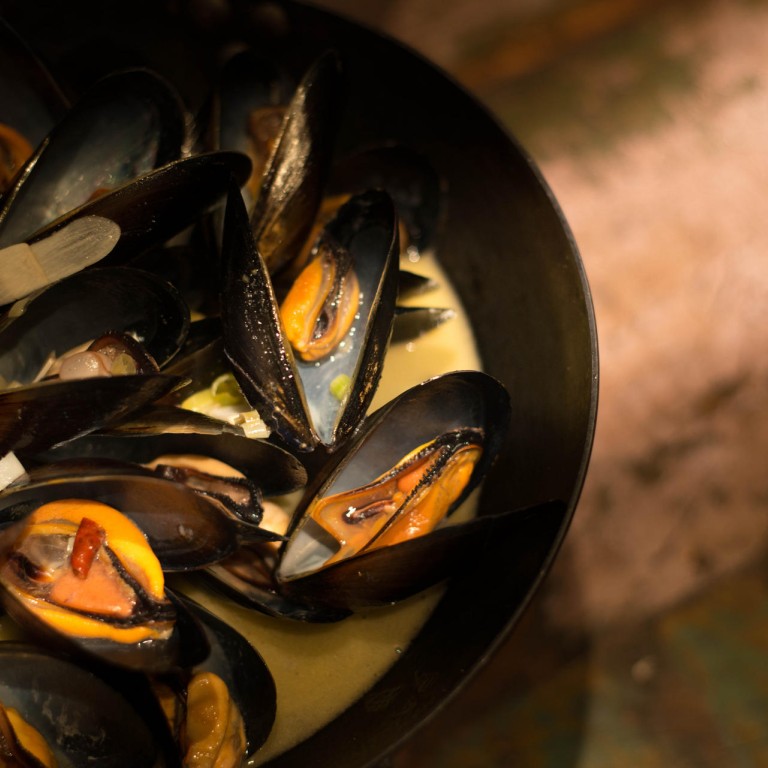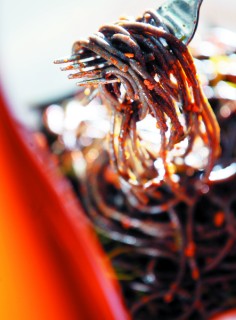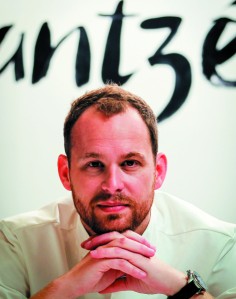
Richly deserved
Top chefs relish wealthy Hongkongers' love of fine dining, writes Andrew Sun
Not too long ago, Hong Kong was considered a cultural and culinary desert. Fine dining here meant a mahogany and brass room where shrimp cocktail was served with a dollop of mayonnaise, followed by chicken à la king with a side of borsch. If the restaurant was extra-posh, waiters would carve roast beef or flambé baked Alaska on a side table. In short, the city was nobody's idea of a gastronomic destination.
But somewhere between the Mid-Levels escalator's construction and the local 's arrival, we went from bland to bountiful. Dining out and food culture became as fashionable as haute couture.
Chef David Laris remembers the scene's halcyon days on his first local visit.
"It was 1995, and I was 25," he recalls. "It was a wild time. I always thought it was an insanely dynamic and cool place. What I observed was the city starting to move away from two-dimensional dining to more organic concepts."
Now, star chefs clamour to stake a claim here. Beyond superstars such as Joël Robuchon, Nobuyuki "Nobu" Matsuhisa, Alain Ducasse and Pierre Gagnaire, many other European, American and Asian chefs have arrived to extend their brand name.
As a traditional free port, Hong Kong offers numerous culinary advantages.
"You have access to great ingredients," Laris says. "That's the difference from [mainland] China. Here, I can get anything I want."
But it's not just fresh fish and vegetables that make Hong Kong a culinary hot spot. Bangkok, Singapore and Tokyo can all import white truffle overnight. For Richard Ekkebus, the two-Michelin star chef of Amber, the difference is the number of wallets willing to pay for it.
"The biggest advantage is here is a clientele base willing to spend on great food," he says. "With over 70,000 millionaires and the fact that the economy is going strong, there is a big clientele to serve."

Having shared his Amber kitchen at the Landmark Mandarin Oriental hotel with guest chefs such as David Thompson, Björn Frantzén and Daniel Boulud, Ekkebus says these gourmet celebrities also gush about the diners' level of food appreciation.
"Hong Kong guests are very savvy on the quality of products and, in particular, seafood," he says. "People are very sensitive to texture, and the palate is far more delicate. So it is not about bold flavours in Asia - it is all in the finesse."
The sophistication and enthusiasm, combined with patrons' ability to afford high-end cooking, are reasons enough to lure many top chefs to Hong Kong.
However, Laris, who already has restaurants in London and Shanghai in his credentials, feels the city is now looking to move beyond formal dining.
The Australian chef just transformed his refined eponymous concept, which only opened last year, into a more casual bistro called The Bellbrook.
"The market is very evolved with both local and expat customers who have a flavour for restaurants and like dining out," Laris says. "They need and want cool things, which pushes development since customers are so discerning. High-end usually does not create innovation. It's safe. The dining scene is shifting. I think more formal is going out. People don't want stuffy and non-engaging."
Another chef defying the elitism of fine dining is Jason Atherton. Despite refusing to take reservations and crowding guests into his eatery 22 Ships, people keep going back for the tasty tapas.

"Most of the restaurants I open are more social in nature, creating a great experience for anyone," he says. "Hong Kong is the New York of Asia. It is truly a melting pot of cuisine - even the local food is of serious, high quality. To survive in this dining scene, you have to work hard and really get it right. It's a challenge, but I love a challenge. Once you have the right recipe, it makes it easier the second time round."
One restaurateur has brought more big-name chefs to the city than anyone else: Sandeep Sekhri of Dining Concepts. From Laris to Greg Malouf of Olive, Michael White of Al Molo, Laurent Tourondel of BLT Steak and Mario Batali of Lupa and Carnevino, Sekhri sold them on Hong Kong without having to pitch too hard.
"When they think of Asia, Hong Kong comes first, not Singapore," Sekhri says. "The disposable income here helps. We don't have the same size of a market as New York City, but we are better than Thailand, Malaysia and Indonesia. Hong Kong has a lot of appeal for international chefs.
The people here are probably one of the world's most travelled, he adds. "Their tastes are very refined. Chefs are also concerned whether they can get all the produce they want, but we can get ingredients even better than New York's."
The deal-closer is often Hong Kong's renowned efficiency. "Their awareness of what we are capable of is not very high," Sekhri says. "Generally they will ask, 'So how long will it take to open? About 12 to 18 months?' And I reply, 'no, it will take us two months'."

The city's culinary stature may be growing, but still there are hurdles that frustrate chefs with Michelin ambitions. One is the acute shortage of qualified staff - finding good waiters has become an almost impossible quest.
The other challenge - no surprise - is securing space.
"Anyone from North America does not understand the real estate market here," Sekhri says. "They are used to 20-year leases instead of five."
Realising celebrity chefs don't only appeal to diners, a part of Sekhri's strategy is to use his partners' cache to secure property in prime locations.
"A good branded product helps in landing good real estate," he says. "It's a great launching pad and a marketing approach. But then you have to live up to people's expectations. It's not a given fact that something that works in London will work here too."
Could it be that Hong Kong diners have become even more critical and savvy than their London and New York counterparts? As its food reputation continues to grow, it's conceivable that the city is taking over as the place where chefs believe: "If I can make it here, I can make it anywhere."

